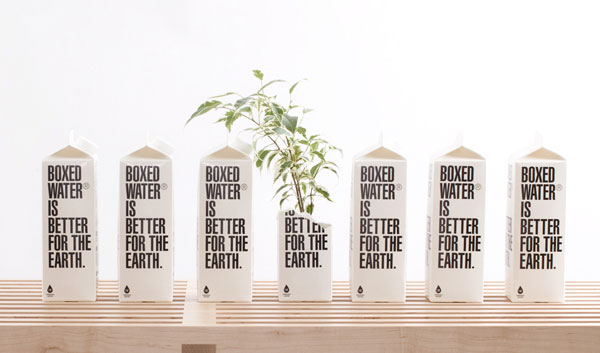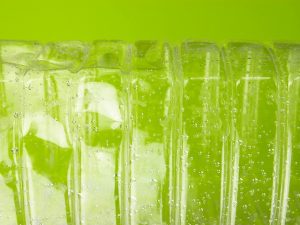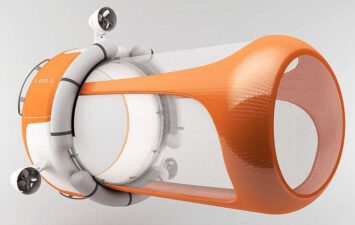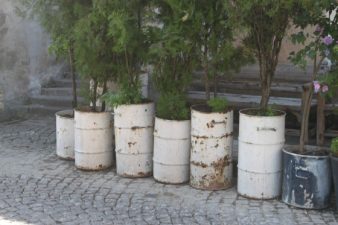The world has witnessed many amazing environmental benefits this year as Coronavirus pandemic stay-at-home orders resulted in drastic global pollution and carbon emission cuts in a matter of months. While these environmental changes have been tangibly seen – bluer skies, decreased smog, healthier oceans – the transition back to “normal” life has presented a new dilemma that could revert this and any previous, positive environmental strides: the immediate resurgence of plastic.
The materials that we rely upon to protect ourselves from the further spread of this virus – such as hand sanitizer bottles, take out containers and utensils, gloves and more – all have one thing in common: they are derived from plastic. While we support these measures to save lives, they present a major sustainability setback, and we are forced to make a choice about how we address planetary protection amidst this post-quarantine reality.
To offset the necessary surge of medical supplies and PPEs, it is up to the rest of us to identify areas for safe, sustainable choices. One major plastic culprit is bottled water. Communal water stations may be on hold at the coffee shops and hotels. Individuals may not feel comfortable filling up their reusable bottle at a drinking fountain. But that doesn’t mean we have to revert back to plastic bottles. Luckily, more sustainable options do exist. And what is the best option? It’s not aluminum cans. Only paper-based cartons such as Boxed Water Is Better® are truly sustainable, safe water substitutes.
As we have seen, plastic has created massive problems for the planet, and the issues continue to stack up. More than 8M metric tons of plastic flow into the oceans annually, and by 2050 there will be more plastic than fish in the ocean. Plastic pollution isn’t going anywhere – by that same year, plastic production is forecasted to triple based on industry projections. While some cities tout recycling as a solution, even this can be problematic. Most plastic bottles don’t even make it into the recycle bin – only 10% do – and will instead end up landfills. For the bottles that are recycled, the environmental impact of oil drilling and blow molding continue to pose a threat to the planet as a part of the overall production process.
The beverage industry is now marketing a new idea: aluminum canned water. But is this really a solution to single-use plastic bottles? Beverage giants such as Coca-Cola (which owns the Dasani water brand) and PepsiCo (owner of Aquafina) will start selling water in cans in the face of public pressure to reduce plastic, but the environmental concerns associated with aluminum could be just as dire. An independent life-cycle study recently found that aluminum cans have a 200% larger carbon footprint than more sustainable solutions such as the Boxed Water brand. Especially for those consuming several aluminum bottles a day, the cost of production, recycling, shipping and handling on the earth could be too much to sustain long-term.
From the planetary point of view, creating aluminum, a material that you don’t find in nature, is not an easy or clean process: aluminum needs to be created using a mineral called bauxite. Strip mined and smelted using an enormous amount of heat, water, and energy, about 20 tons of bauxite is required to make 1 ton of aluminum. Breaking down aluminum in recycling processes also creates a pile of unwanted waste known as red mud.
Compared to aluminum (which is mined from Bauxite), Boxed Water is 50% lower impact on ozone depletion and smog emissions from smelting, and 33% lower impact on acidification due to deforestation. Compared to plastic, Boxed Water has a 64% lower carbon footprint (lower contributor to global warming), 43% less fossil fuel use, and 1,084% lower in impact on the ozone.
With sustainability in mind, Boxed Water was created to provide a practical solution to the single-use plastic challenge. Like many other products ranging from soup to milk, Boxed Water is packaged in recyclable cartons made using paper from well-managed forests. We’ve also launched a plant-based cap, derived from residue waste from FSC-certified sustainably grown trees used for pulp and bioenergy, which has lower CO2 emissions than petroleum and sugarcane-based plastics.
Boxed Water is leading initiatives in educating consumers about the difference between boxes (mainly made from paper), plastics and aluminum. As a proud member of 1% For The Planet and partner of the National Forest Foundation (NFF) and Ocean Blue Project, Boxed Water has cleared beaches of thousands of plastic bottles and this year planted their one millionth tree as a part of our long-standing reforestation efforts. The trees planted will provide clean water and purify the air of 500,000 tons of carbon dioxide.
As we all become more vigilant about the safety of the products we utilize, we cannot forget to consider how a single plastic bottle used for 15 minutes today will affect the next 700 years on our planet. We may be getting accustomed to this new normal, but let’s ensure that it is also a better normal for our world.





Boxed Water is 92% plant based, which includes a plant-based cap. And the life cycle studies takes more into consideration beyond recycling, which is the goal of real sustainability measures. Nearly 75% of US consumers live within a facility that can recycle the cartons.
The Life Cycle Analysis used by Boxed Water is Better does not take into consideration the fact that aluminum cans have 73% post-consumer material. This leads to a huge and unrealistic overestimation of carbon emissions created by aluminum cans. If you actually take true recycled content into consideration, the carbon footprint for a 16oz can is actually smaller than that of a 16oz carton. Not to mention the fact that cartons like Boxed Water actually have as much plastic as a plastic bag (they have plastic payers in the main package and a plastic cap) AND they are recycled less than PET bottles. It’s a terrible solution overall and complete greenwashing.